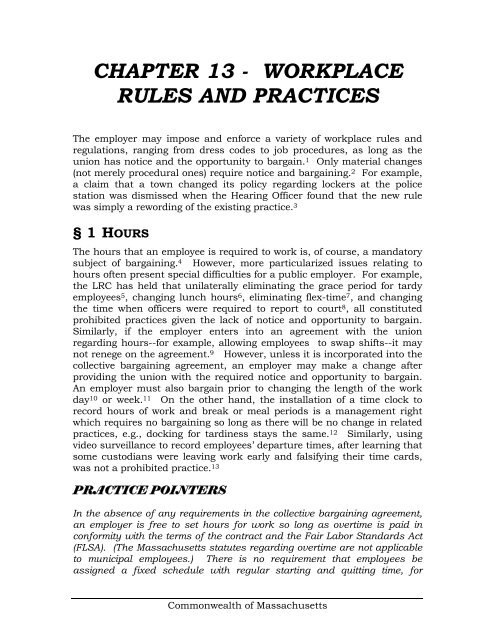Management Rights - AELE's Home Page
Management Rights - AELE's Home Page
Management Rights - AELE's Home Page
You also want an ePaper? Increase the reach of your titles
YUMPU automatically turns print PDFs into web optimized ePapers that Google loves.
CHAPTER 13 - WORKPLACE<br />
RULES AND PRACTICES<br />
The employer may impose and enforce a variety of workplace rules and<br />
regulations, ranging from dress codes to job procedures, as long as the<br />
union has notice and the opportunity to bargain. 1 Only material changes<br />
(not merely procedural ones) require notice and bargaining. 2 For example,<br />
a claim that a town changed its policy regarding lockers at the police<br />
station was dismissed when the Hearing Officer found that the new rule<br />
was simply a rewording of the existing practice. 3<br />
§ 1 HOURS<br />
The hours that an employee is required to work is, of course, a mandatory<br />
subject of bargaining. 4 However, more particularized issues relating to<br />
hours often present special difficulties for a public employer. For example,<br />
the LRC has held that unilaterally eliminating the grace period for tardy<br />
employees 5 , changing lunch hours 6 , eliminating flex-time 7 , and changing<br />
the time when officers were required to report to court 8 , all constituted<br />
prohibited practices given the lack of notice and opportunity to bargain.<br />
Similarly, if the employer enters into an agreement with the union<br />
regarding hours--for example, allowing employees to swap shifts--it may<br />
not renege on the agreement. 9 However, unless it is incorporated into the<br />
collective bargaining agreement, an employer may make a change after<br />
providing the union with the required notice and opportunity to bargain.<br />
An employer must also bargain prior to changing the length of the work<br />
day 10 or week. 11 On the other hand, the installation of a time clock to<br />
record hours of work and break or meal periods is a management right<br />
which requires no bargaining so long as there will be no change in related<br />
practices, e.g., docking for tardiness stays the same. 12 Similarly, using<br />
video surveilance to record employees’ departure times, after learning that<br />
some custodians were leaving work early and falsifying their time cards,<br />
was not a prohibited practice. 13<br />
PRACTICE POINTERS<br />
In the absence of any requirements in the collective bargaining agreement,<br />
an employer is free to set hours for work so long as overtime is paid in<br />
conformity with the terms of the contract and the Fair Labor Standards Act<br />
(FLSA). (The Massachusetts statutes regarding overtime are not applicable<br />
to municipal employees.) There is no requirement that employees be<br />
assigned a fixed schedule with regular starting and quitting time, for<br />
Commonwealth of Massachusetts
















